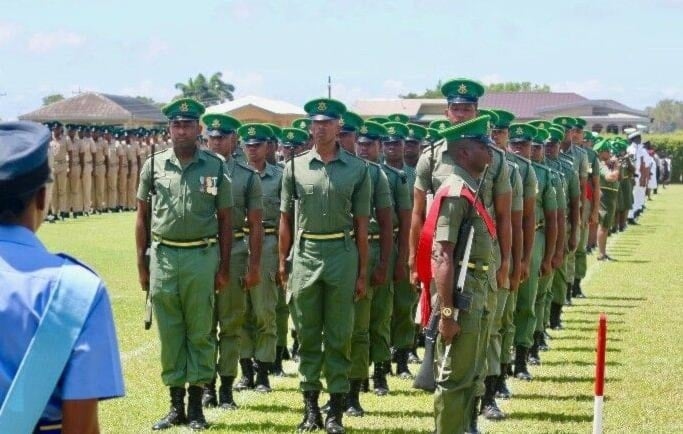Trinidad and Tobago on high alert as US-Venezuela tensions escalate
Trinidad and Tobago placed its armed forces on high alert as the United States reactivates military bases and expands deployments across the Caribbean under an alleged anti-narcotics campaign.
-

This undated image shows members of the Trinidad and Tobago Defence Force standing in formation during a readiness drill (Trinidad Defence Force photo)
The armed forces of Trinidad and Tobago were placed on the highest state of alert Friday amid mounting concerns that the United States may be preparing military action against Venezuela. The Trinidad Express reported that all personnel in the country’s defense forces and coast guard were ordered to return to their bases no later than 6:00 p.m. local time (22:00 GMT). "This is not a drill," the directive read.
Senior military officials held an emergency meeting earlier in the day, after which the country was moved to State One, the highest level of operational readiness. Officers were instructed to remain at their stations or official residences, ready to respond to any potential unrest or regional crisis.
The alert followed reports in Western media suggesting that Washington was on the verge of launching airstrikes against Venezuelan military sites. The Miami Herald cited unnamed sources claiming that such strikes could begin "in a matter of days or even hours," a story that immediately drew an official response from US Secretary of State Marco Rubio.
"Your ‘sources’ claiming to have ‘knowledge of the situation’ tricked you into writing a fake story," Rubio wrote on X, calling the report entirely false.
His denial, however, did little to ease regional concerns. Over the past two weeks, the United States has dramatically expanded its military presence across the Caribbean, officially under the banner of an "anti-narcotics campaign." The Pentagon recently deployed the Gerald R. Ford Carrier Strike Group to the US Southern Command region, saying the mission was aimed at "detecting, monitoring, and disrupting illicit actors."
Caribbean Escalation
Observers argue that the war-on-drugs justification serves as a pretext for renewed US militarization and possible regime-change operations against Venezuela and Colombia. The deployment coincided with a US strike on a vessel allegedly linked to the Tren de Aragua group, which killed six people in the Caribbean Sea, an act Caracas denounced as a "violation of international law." Four days later, the US conducted another aggression on four vessels in the Eastern Pacific, killing 14 people and leaving one survivor.
Regional militaries have since gone on alert. Earlier this week, satellite imagery revealed US warships, including the USS Iwo Jima, operating roughly 200 kilometers from Venezuela’s La Orchila Island. The escalation comes as Senator Lindsey Graham confirmed that President Donald Trump is considering expanding US operations to include potential ground actions in both Venezuela and Colombia, describing the move as "a real possibility."
Meanwhile, Bloomberg reported that the former US Navy base at Roosevelt Roads in Puerto Rico, once decommissioned after mass protests in 2004, has been reactivated as a forward-operating hub for warplanes, surveillance aircraft, and rapid troop deployments. Once envisioned as a civilian redevelopment site, the 8,700-acre complex now hosts F-35B fighter jets, Ospreys, and C-17 Globemasters, transforming Puerto Rico’s José Aponte de la Torre Airport into an active military airfield.
The revival of Roosevelt Roads has stirred unease in Puerto Rico, where memories of US military occupation in Vieques remain raw. Environmental damage and community displacement caused by decades of bombing exercises led to years of protests and arrests, including that of Robert F. Kennedy Jr., the US Secretary of Health and Human Services. Locals like Army veteran Monisha Ríos describe the base’s reactivation as “a provocation,” warning that it once again turns the Caribbean into a launchpad for violence.
Regional Volatility
Caracas has condemned the US buildup as an act of aggression disguised as counter-narcotics enforcement, warning that any direct attack would be met with "a proportional response." President Nicolás Maduro accused Washington of fabricating drug trafficking narratives to justify intervention and destabilize Latin America.
While Washington’s allies, such as Trinidad and Tobago and Grenada, have offered limited logistical cooperation, the broader region remains divided. A recent declaration by 14 CARICOM members reaffirmed their commitment to maintaining the Caribbean as a “zone of peace,” urging that security challenges be addressed within international law. Puerto Rico, as a US territory, was notably absent from the declaration.
Despite Rubio’s dismissal of the reports as “fake,” the scale of US deployments, the reactivation of dormant bases, and intensified naval movements across the Caribbean suggest the region is entering one of its most volatile phases in decades.
Read more: Trump’s Maduro obsession resurfaces with new CIA ops., troop buildup

 4 Min Read
4 Min Read










